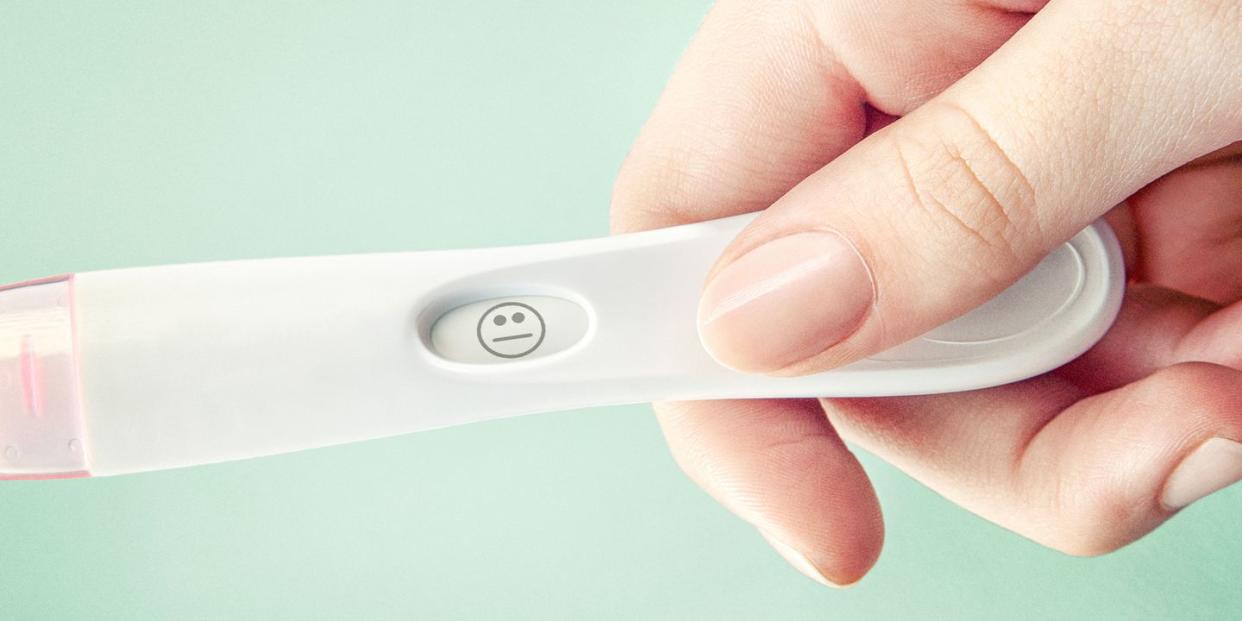Can You Get Pregnant on Your Period? Here's Everything You Need to Know

If you still feel a little weird about having period sex, one thing might ease your mind: lots of men are into it - in part, because some think it's a worry-free pass for unprotected sex. BUT WAIT. That's so not true. Before you toss your condom to the side, here's everything you need to know about the likelihood of getting pregnant on your period, according to an ob-gyn.
What are the phases of a menstrual cycle?
The first step of knowing if you can get pregnant on your period is understanding your menstrual cycle, which is ... complicated. Most women's cycles last around 28 days - but that's not always the case and things can change from month-to-month.
There are several phases that take place within those (on average) 28 days, starting with the menstrual phase (a.k.a. your period). The day you get your period is the first day of your cycle, and it lasts up to seven or so days. Then there's the follicular phase, which is when your body prepares to fertilize an egg.
The ovulation phase occurs when your body releases a mature egg with the goal of it becoming fertilized. And, finally, there's the luteal phase. If your egg is fertilized, you might have a baby on the way, and if it's not, the lining of your uterus sheds per usual, which kicks off your period and repeats the cycle.
"The time from getting that egg out to having your period if you're not pregnant is typically 14 days. What's variable for people is the warm-up phase - the so-called follicular phase - when the egg is getting ready," says Mary Jane Minkin, MD, clinical professor of Obstetrics, Gynecology, and Reproductive Sciences Yale School of Medicine.
Can you get pregnant on your period?
Anytime you have sex, there's a chance that could result in a baby - whether you're on your period or not. But having sex while you're ovulating is when you're most likely to get pregnant and having sex while you're on your period is when you're least likely - unless you have a super-short cycle.
"If you have sex the last day of your period, the sperm can hang around for a while," Dr. Minkin says. "It's highly unlikely that someone would ovulate during their period, but if you have sperm deposited the last day of your period and you happen to ovulate very early in your cycle - maybe four or five days after your period - the sperm could fertilize the egg, resulting in pregnancy."
Dr. Minkin says this doesn't happen very often, because most people don't have that short of a cycle and it usually takes a longer period of time to fertilize an egg, but it is possible. That's why it's so important to figure out when you're ovulating, because you'll know if you're at risk of getting pregnant on your period and when you're most fertile.
"In general, if you have a cycle that's 23 days, you're probably ovulating around day nine, and if your cycle is 33 days, you're probably ovulating on day 19," Dr. Minkin says. Ovulation lasts for 12 to 48 hours, but since sperm can survive in your body for around four to five days, you could be fertile for up to seven or more days. Which, Dr. Minkin points out, is actually a pretty wide window.
How can you prevent pregnancy?
If you're trying to avoid becoming pregnant, Dr. Minkin recommends always using protection, whether that's birth control or condoms. And, don't rely on any other rumored preventative methods, like douching or pulling out - because they don't work.
"The problem is the sperm that gets you pregnant gets up there really quickly after ejaculation - they can be in the cervix in as little as 20 minutes, so if you do a douche an hour or two later, it's not going to keep you from getting pregnant," she says. "As for withdrawing, even the first drop of sperm has a lot of stock in it: there are millions of those guys, and it's really concentrated stuff. So even if he pulls out (as it's commonly known) one or two drops of seminal fluid is all you need to become pregnant."
So if your goal is to not get pregnant, the only surefire way to protect yourself is not having sex at all. Other than that, there's always a chance - so be safe and smart.
Follow Redbook on Instagram.
You Might Also Like


